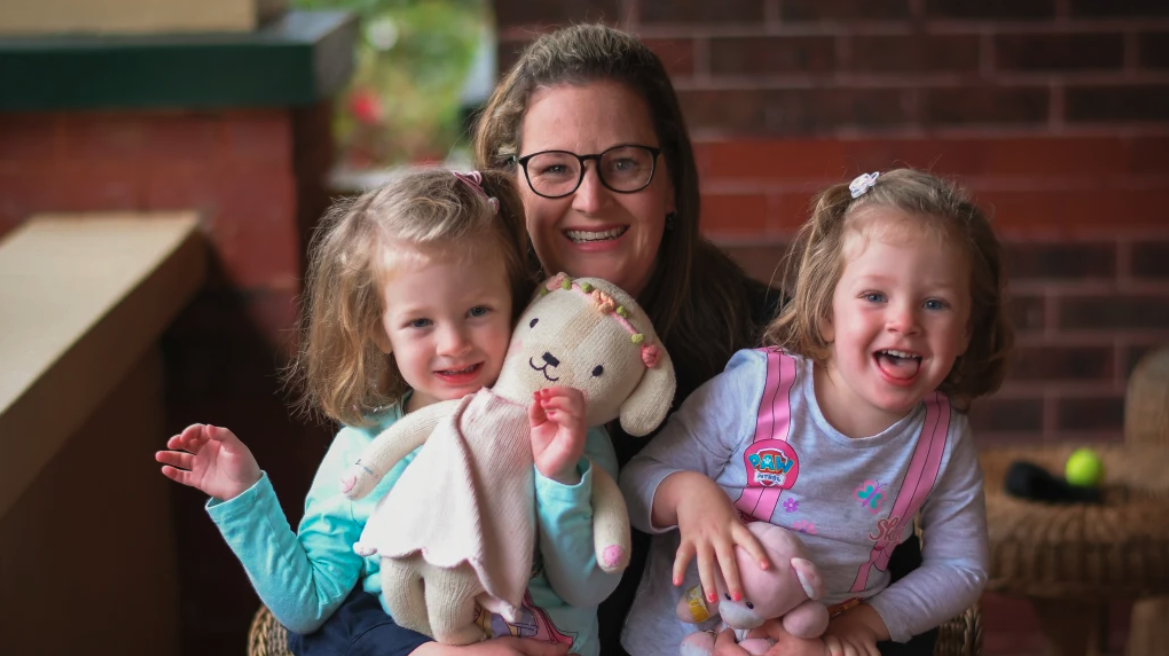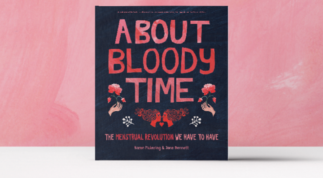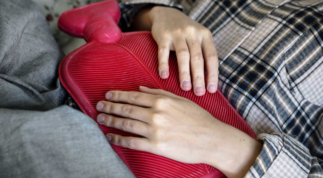Kate Marshall (Health and Community Services Union) and her daughters.
Photograph: Eddie Jim, The Age
On 22 September Victoria’s Health and Community Services Union (HACSU) launched their campaign to introduce Reproductive Health and Wellbeing Leave as one of their key claims in their current Mental Health Enterprise Agreement bargaining.
Reproductive and Sexual Health Leave includes:
- the right to work from home
- the right to a comfortable working environment to alleviate symptoms or facilitate treatment
- the right to access up to 5 days leave per year in addition to any personal leave days.
The Reproductive Health and Wellbeing Leave is the first of its kind in Australia and for HACSU this leave clause,
‘is the next step on this path of improved working conditions for all. It forms an important part of our arsenal in tackling systemic gender inequality in our workplaces. While reproductive health issues can affect everyone, it is disproportionately women and trans people who are adversely affected by the status quo in getting the time they need to address their reproductive health concerns, having to ‘use up’ their other leave. Our claim will address that.’
In recognition of the Trust’s work on About Bloody Time and our Menstrual and Menopause Workplace Wellbeing Policy, Mary Crooks AO (executive director, VWT) and Karen Pickering (co-author, About Bloody Time) joined Paul Healey (state secretary, HACSU), Kate Marshall (assistant state secretary, HACSU) and Tanja Kovac (CEO, GENVIC) in speaking at at the launch event.
Paul Healey (state secretary, HACSU) started by talking about what the reproductive leave clause campaign means for HACSU, “it’s recognising that we need to remove barriers for people to go to work and work successfully and that we need to support people’s lives and their hopes, dreams and wishes. It’s already gained some amazing attention and attraction, it started as a small idea in the office and we’ve been able to draw in a lot of people and the clause is to support all people.”
Kate Marshall (assistant state secretary, HACSU) spoke about the importance of reproductive rights and the hope for the leave clause beyond HASCU, “this clause is a start to assist our members and in time, all of Australian workers, with their reproductive health, so when our kids and grandkids become workers, it is a workplace right. We hope this becomes nationwide…this proposal is for every worker. There is no discrimination. It is for everyone.”
Continuing the conversation around the momentum for these kinds of changes in workplaces, Mary Crooks AO spoke about the Trust’s experience of interest from around the world in our Menstrual and Menopause Workplace Wellbeing Policy, ‘since we’ve done out work on menstruation and menopause we’ve had about one query a week globally and from Australia, we are riding a cusp of a wave around this reform.’
Mary then talked about the effect introducing the policy has had on the Trust workplace,
“In the 3 years that we’ve had the policy we’ve had 24 days of leave taken, the sky hasn’t fallen in. One of the important things is that the benefits across our office are immeasurable, our culture is more open, it’s supportive, for example, it’s not uncommon for peers to talk openly about which menstrual cup they prefer. We also have free products in our toilets. This leave provision has made our staff appreciative of who we are, that the organisation cares and that we are providing a constructive and supportive workplace environment. Our staff have felt more empowered, more in control, encouraged to self-care more than they would have. Nothing but positives…This is the standard which we think should be striving for in all of our workplaces…I think these conversations across sectors need to happen and that is all to the good.”
Tanja Kovac (CEO, GEN VIC), who had worked with HACSU on developing the leave clause, congratulated the union on their work and talked about the importance of the clause and its connection to women’s unpaid work: “The leave clause demands that workers are seen as full human beings who need to be cared about and taken into account and acknowledges that our reproductive health is about our mental health and shouldn’t be seen as a sickness and is about worker wellbeing…Our workplaces and economies having this leave is the start of our country recognising gendered labour.”
Tanja spoke up how important layering change and many organisations pushing forward create the momentum we need to achieve progress:
“Progress happens when we layer brave organisations, when one organisation stands up and does something brave, it lays the way for other organisations to do something brave too and we are indebted to the work of Mary, and Jane and Karen’s book.”
Karen Pickering (co-author, About Bloody Time) picked up on Tanja’s point about progress, “Change is coming, because the type of change we need to see about menstrual wellbeing and reproductive health is so necessary and for that kind of social change we need unions.”
The event ended with Karen’s response to an audience question about how to start these conversations about leave clauses in workplaces, “If you find the allies in your workplaces and in your space you can share courage with each other and feel validated and strong enough to have those discussions and questions then band together and fight for change.”
For more information please visit the Health and Community Services Union (HACSU) website.
 Casimira Melican (Project Manager, About Bloody Time) has been at the VWT since 2015. In 2016, Casimira co-wrote the VWT’s menstrual and menopause workplace wellbeing policy (also know as the menstrual leave policy) and has been leading advocacy on the policy since then. Casimira is passionate about the ability for policy and research to have real world impact and empower women and non-binary individuals within our society.
Casimira Melican (Project Manager, About Bloody Time) has been at the VWT since 2015. In 2016, Casimira co-wrote the VWT’s menstrual and menopause workplace wellbeing policy (also know as the menstrual leave policy) and has been leading advocacy on the policy since then. Casimira is passionate about the ability for policy and research to have real world impact and empower women and non-binary individuals within our society.


